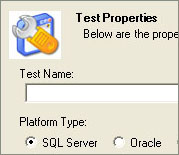Intel Xeon 3.6 2MB vs AMD Opteron 252 Database Test
by Jason Clark & Ross Whitehead on February 14, 2005 8:00 AM EST- Posted in
- IT Computing
SQL Stress Tool Benchmark
Our first benchmark was custom-written in .NET, using ADO.NET to connect to the database. The AnandTech Forums database, which is over 14GB in size at the time of the benchmark, was used as the source database. We'll dub this benchmark tool "SQL Stress Tool" for the purposes of discussing what it does. We have done some updates to the tool since we first used it; it now supports Oracle, and MySQL. We also adjusted the test time for this test and future tests to 20 minutes. The reason for this was to ensure that we used as much memory as possible for future planned 64 bit tests.
SQL Stress allows us to specify the following: an XML based workload file for the test, how long the test should run, and how many threads it should use in which to load the database. The XML workload file contains queries that we want executed against the database, and some random ID generator queries that populate a memory resident array with ID's to be used in conjunction with our workload queries. The purpose of using random ID's is to keep the test as real-world as possible by selecting random data. This test should give us a lot of room for growth, as the workload can be whatever we want in future tests.
Example workload:
Example Random ID Generator:
The workload used for the test was based on every day use of the Forums, which are running FuseTalk. We took the most popular queries and put them in the workload. Functions, such as reading threads and messages, getting user information, inserting threads and messages, and reading private messages, were in the spotlight. Each reiteration of the test was run for 20 minutes, with the first being from a cold boot. SQL was restarted in-between each test that was run consecutively.
The importance of this test is that it is as real world as you can get; for us, the performance in this test directly influences what upgrade decisions we make for our own IT infrastructure.











97 Comments
View All Comments
bob661 - Monday, February 14, 2005 - link
#14The difference is the 2xx can go up to 2 CPU's and the 8xx can go up to 8 CPU's. That's it.
Ross Whitehead - Monday, February 14, 2005 - link
R3MF, we plan to discuss w/ AMD and Tyan the lack of benefit the 1 GHz HyperTransport provided.Jason Clark - Monday, February 14, 2005 - link
ceefka, meager? 3 of the most popular uses of a database? If there is something you think we are missing, please reveal ;).We'll work on a web article asap.
ksherman - Monday, February 14, 2005 - link
is it just me, or did you take the best Xeon and put it against a mid range Opteron? what about the 8xx series? what is the difference between 2xx and 8xx?blackbrrd - Monday, February 14, 2005 - link
Seems Intel just turned the table again. What about webserver performance?blckgrffn - Monday, February 14, 2005 - link
I meant on the desktop, which is why the PM doesn't really count, sorry I wasn't more clear on that...blckgrffn - Monday, February 14, 2005 - link
I hope that the upcoming prescotts with 2meg L2 cache show similar improvements across the board - not because I am Intel fan, but really AMD hasn't had much in the way of direct competition from Intel lately (the PM doesn't count)Every benchmark has been: The 3000+ AMD64 is better than nearly any P4 for gaming performance, and if you really want to win all the benches but one or two, shell out for the fx-55... kind of boring, really :)
ceefka - Monday, February 14, 2005 - link
However meager the benchies, it proofs my point that a company should mix and match according to their needs and not just stick with one or the other because their supplier says they shoud buy this or that.We have lots of financial data and scans, tables etc. going here, so a 4-way Opteron can be justified to sit between a few Xeon boxes for other apps. Unfortunately we're in the Intel comfort zone and browsing through accounts, scans and tables is therefore tedious.
R3MF - Monday, February 14, 2005 - link
just because i'm awkward -i'd like to see a comparison between a:
> FX55 (2.6GHz) & O252 (2.6GHz)
> nF4 Ultra & nF4 Pro (abit wln8+)
> 2x 512MB DDR500
> 2x 300GB Max10 NCQ
> 6800 Ultra
in order to see whether the core enhancements in the new Opteron make a difference........?
am i asking for too much? :p
gordon151 - Monday, February 14, 2005 - link
Yeah, this article needs to be re-written because the Opteron doesn't crush Xeon. These numbers are dubious!